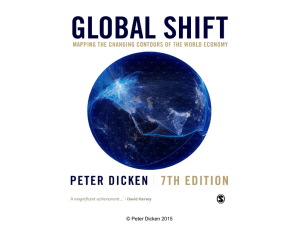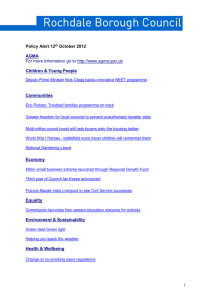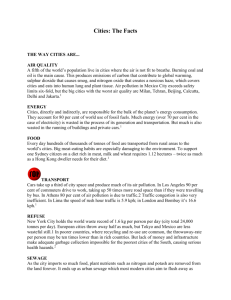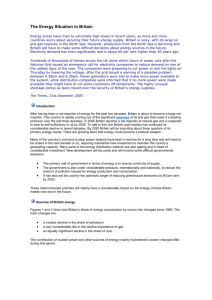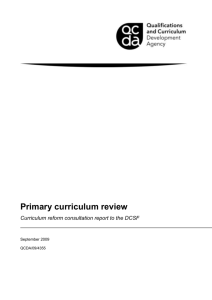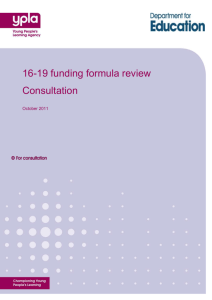20151203 Attitudes to Infrastructure press release FINAL
advertisement
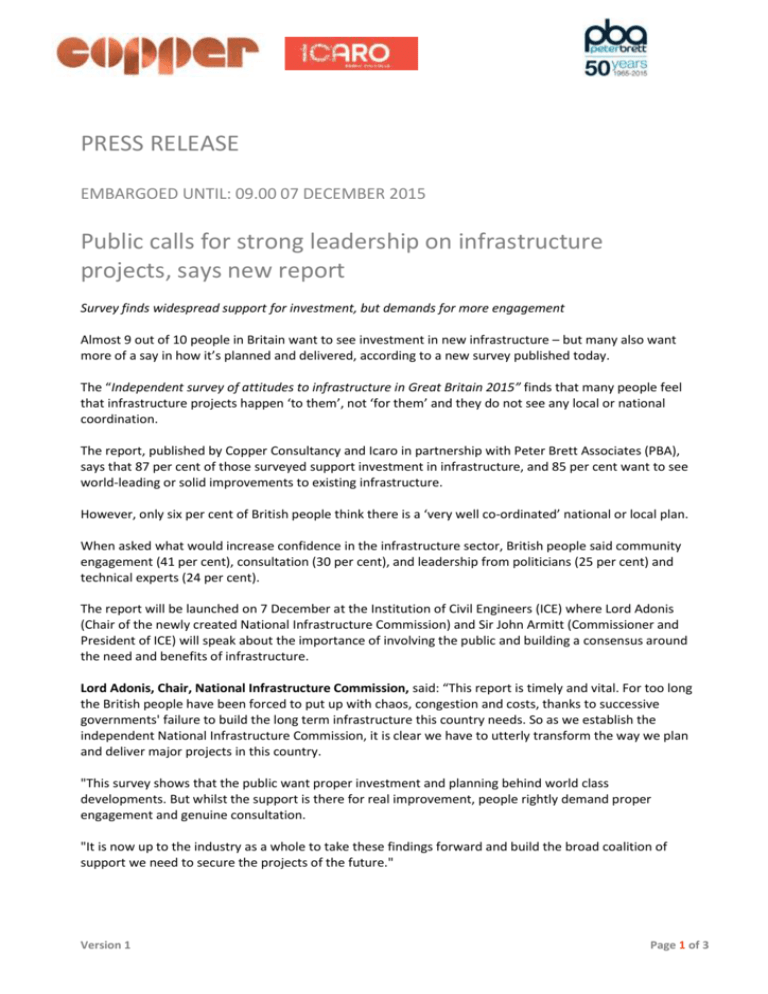
PRESS RELEASE EMBARGOED UNTIL: 09.00 07 DECEMBER 2015 Public calls for strong leadership on infrastructure projects, says new report Survey finds widespread support for investment, but demands for more engagement Almost 9 out of 10 people in Britain want to see investment in new infrastructure – but many also want more of a say in how it’s planned and delivered, according to a new survey published today. The “Independent survey of attitudes to infrastructure in Great Britain 2015” finds that many people feel that infrastructure projects happen ‘to them’, not ‘for them’ and they do not see any local or national coordination. The report, published by Copper Consultancy and Icaro in partnership with Peter Brett Associates (PBA), says that 87 per cent of those surveyed support investment in infrastructure, and 85 per cent want to see world-leading or solid improvements to existing infrastructure. However, only six per cent of British people think there is a ‘very well co-ordinated’ national or local plan. When asked what would increase confidence in the infrastructure sector, British people said community engagement (41 per cent), consultation (30 per cent), and leadership from politicians (25 per cent) and technical experts (24 per cent). The report will be launched on 7 December at the Institution of Civil Engineers (ICE) where Lord Adonis (Chair of the newly created National Infrastructure Commission) and Sir John Armitt (Commissioner and President of ICE) will speak about the importance of involving the public and building a consensus around the need and benefits of infrastructure. Lord Adonis, Chair, National Infrastructure Commission, said: “This report is timely and vital. For too long the British people have been forced to put up with chaos, congestion and costs, thanks to successive governments' failure to build the long term infrastructure this country needs. So as we establish the independent National Infrastructure Commission, it is clear we have to utterly transform the way we plan and deliver major projects in this country. "This survey shows that the public want proper investment and planning behind world class developments. But whilst the support is there for real improvement, people rightly demand proper engagement and genuine consultation. "It is now up to the industry as a whole to take these findings forward and build the broad coalition of support we need to secure the projects of the future." Version 1 Page 1 of 3 Sir John Armitt, President of the Institution of Civil Engineers and National Infrastructure Commissioner said: “Public interest in infrastructure is as much driven by fear of disrupted lives as it is by a promise of greater convenience, speed or improved quality of life. The challenge for us all – ICE, Government and the NIC alike - is to open up the debate and address these fears. Our ability to explain – in plain language what we are trying to achieve and why, to be prepared to consider alternative solutions and to put ourselves in the public’s shoes is absolutely vital if we are to gain sufficient political and public support, without which important projects simply cannot proceed.” Linda Taylor, Director, Copper Consultancy said: “British people want infrastructure. They believe we can deliver it and can see the benefits when it happens. But they want to see a plan, they want to see how it all fits together, they want to be involved and they want to see more leadership. The new National Infrastructure Commission is a great start, but the hard work starts now. We need to explain and open up the infrastructure debate to the Great British public. “The majority of people want to know how they can get involved in infrastructure in a more direct way. When the benefits of a project are made clear, people sit up and are proud of what we can achieve such as the Olympics, transport projects in towns and cities and major engineering projects.” Keith Mitchell, Chairman, Peter Brett Associates said: “There is public understanding about the need for investment in infrastructure as a way of supporting sustainable economic growth. The public feels that major projects happen to communities, rather than for them. Effective political and technical leadership and meaningful engagement and consensus building are essential to unlocking projects.” ENDS For more information please contact Martin McCrink at Copper Consultancy on 0117 929 0366 / 020 7935 1222 martin.mccrink@copperconsultancy.com Notes to editors To download the report - “Independent survey of attitudes to infrastructure in Great Britain 2015” please visit www.copperconsultancy.com (from 9.00am 7 December 2015) About Copper provides communications and stakeholder engagement across the energy, resources, transport, water and built environment sectors. With offices across the UK, Copper offers over 30 years of expertise in communications for multi-million pound projects, working across both the public and private sectors. Icaro is a specialist research agency. It provides primary and secondary research, facilitation, consultation management and evaluation services. Behaviour change is a key focus in relation to sustainability issues, such as waste and recycling, energy and climate change, water use, public health and transport. Celebrating its 50th anniversary this year, leading development and infrastructure consultancy Peter Brett Associates LLP is an independent practice of engineers, planners, economists, and environment and property professionals. With offices across the UK, PBA has a strong reputation for its work with public and private sector clients on a diverse range of projects, including urban regeneration; major infrastructure, sustainable housing and water management. Key recommendations summary Develop a positive narrative – the public want to hear about future investment. There is a strong sense that the UK should be aspirational in its thinking about infrastructure. Demonstrate a strategic approach – the National Infrastructure Commission is well placed to explain the benefits of infrastructure but it is much more than that. It can take a joined up approach to infrastructure (including housing) and provide evidence about the benefits as a way of improving the quality of the engagement and consensus building. Engage – two in three (67%) are interested in being involved in discussions about the future infrastructure needs of their area/region. People said that community engagement and consultation would increase their confidence. Lead – the public think there is a pressing need for leadership on infrastructure. There is also strong backing for input Page 2 of 3 from technical experts which would increase public confidence. The National Infrastructure Commission is well placed to address this. Demonstrate balance – the research points to an unresolved tension between the national need and safeguards to protect communities and the environment. On the one hand, the public are concerned that the balance of power favours developers over local communities and environmental protection. On the other, there is a desire for less red tape and quicker delivery. The research also detects a noticeable perception that London benefits disproportionately from new investment – a view that Londoners reject. Research methodology The research was carried out by Icaro, a specialist research agency. For more information visit: http://www.icaro.uk.com/ Qualitative Four focus groups were conducted in late May 2015 – in London, Bristol, Kenilworth and Stockport. Each group involved eight participants (32 in total), with participants selected to represent a broad cross-section of the British population according to age, gender, work status and voting pattern in the May 2015 election. Groups were 1.5 hours long and participants received a £40 ‘thank you’ for their time. Quantitative Based on the insights gained from the focus groups, a survey was designed and undertaken with a sample of 2,000 adults aged 18+ in Great Britain. Fieldwork took place from the 9 – 17 June 2015. Quotas were set on age, gender, region and work status to ensure that the sample matches the known profile of the British population. An additional 500 interviews were undertaken in cities as part of an urban boost (including London, Bristol, Cardiff and the ‘Northern Powerhouse’ cities of Leeds, Liverpool, Manchester, Sheffield, Hull and Newcastle). This provides a robust overall data set for the country as a whole, as well as the means to undertake detailed analyses on groups within the population (e.g. urban vs. rural, older vs. younger adults, Conservative voters in May 2015 vs. Labour voters, and so on). Page 3 of 3


